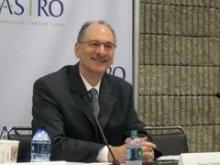ATLANTA – Men with intermediate-risk prostate cancer fared just as well over the long term with 8 weeks as with 28 weeks of neoadjuvant androgen suppression before receiving concomitant androgen suppression and radiation, said Dr. Thomas M. Pisansky at the annual meeting of the American Society for Radiation Oncology.
Based on follow-up data from the RTOG 9910 trial, 10-year disease-specific survival rates were virtually identical for the two groups at 95% and 96%. Further, 10-year biochemical failure rates were exactly the same at 27%. Nor were there any significant differences in either locoregional progression at 10 years (6% vs. 4%) or in distant metastases (6% in each group).
"In 10-years of follow-up, the disease-specific survival of men treated in either fashion is extraordinarily high," said Dr. Pisansky, principal investigator for the trial, and a professor of radiation oncology at the Mayo Clinic in Rochester, Minn.
"It’s quite clear to us: The recommendation is that the preradiotherapy neoadjuvant androgen suppression need last no longer than 8 weeks. When you combine the preradiotherapy with the concurrent radiotherapy/androgen suppression, it need last no more than 16 weeks," he said at a media briefing before his presentation of the data in plenary session.
A radiation oncologist who was not involved in the study commented that it reinforces the importance of optimizing therapeutic regimens.
"From personal experience, when you shorten treatment, patients at least perceive that their quality of life is better," said Dr. Bruce G. Haffty, a radiation oncologist at the Cancer Institute of New Jersey in New Brunswick, and ASTRO president-elect.
Dr. Haffty moderated the briefing at which Dr. Pisansky discussed his data.
The investigators enrolled men with intermediate-risk prostate cancer into the trial, with accrual ranging from February 2000 through May 2004. The participants were randomly assigned to receive either 8 weeks (752 men) or 28 weeks (737 men) of neoadjuvant total androgen suppression with a luteinizing hormone-releasing-hormone analog and nonsteroidal antiandrogen. All patients then received radiation therapy of 70.2 Gy divided into 39 fractions with doses to the seminal vesicles and pelvic nodes as needed, concurrent with 8 additional weeks of total androgen suppression.
After a median follow-up of 8.7 years for all patients and 9.3 years for all survivors, 3% of all patients had died from prostate cancer. There were 30 prostate cancer deaths in the 8-week arm, and 24 in the 28-week arm, a difference that was not significant. Biochemical failures, defined as at least a 2 ng/dL rise in prostate specific antigen [PSA] from the PSA nadir), occurred in 192 of 752 patients assigned to 8 weeks neoadjuvant suppression, and in 185 of 737 assigned to 28 weeks.
Late radiation toxicities of grade 2 or greater occurred in 10% of patients in the 8-week arm, and in 8% of those in the 28-week arm. Sexual adverse events of grade 2 or greater occurred in 8% and 17%, respectively.
The evidence indicates that "there is little room for improvement in disease-specific survival and overall survival," and that studies seeking to show further benefit would be difficult to accomplish, Dr. Pisansky said.
He noted that as with breast cancer, there is likely to be a shift away from survival outcomes toward decreasing biochemical failure rates, reducing need for secondary therapies, and toward establishing an ideal radiation therapy dose.
The study was supported by grants from the National Cancer Institute. Dr. Pisansky and Dr. Haffty reported having no relevant conflicts of interest.


